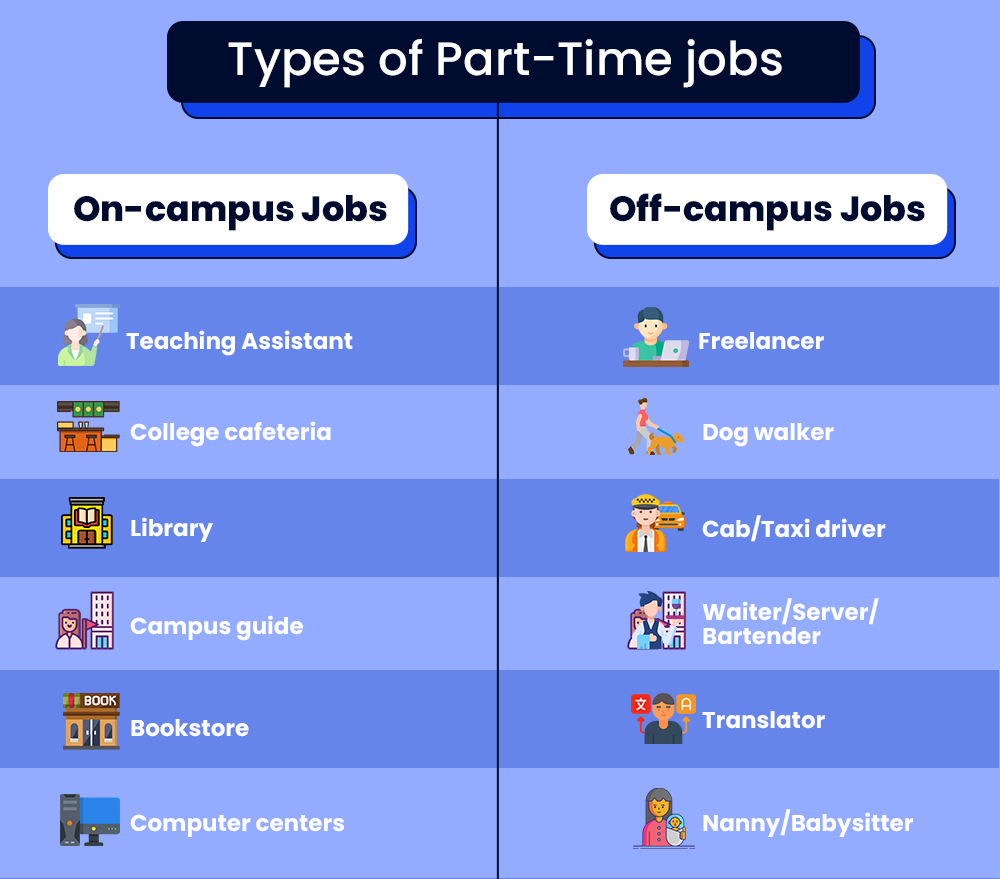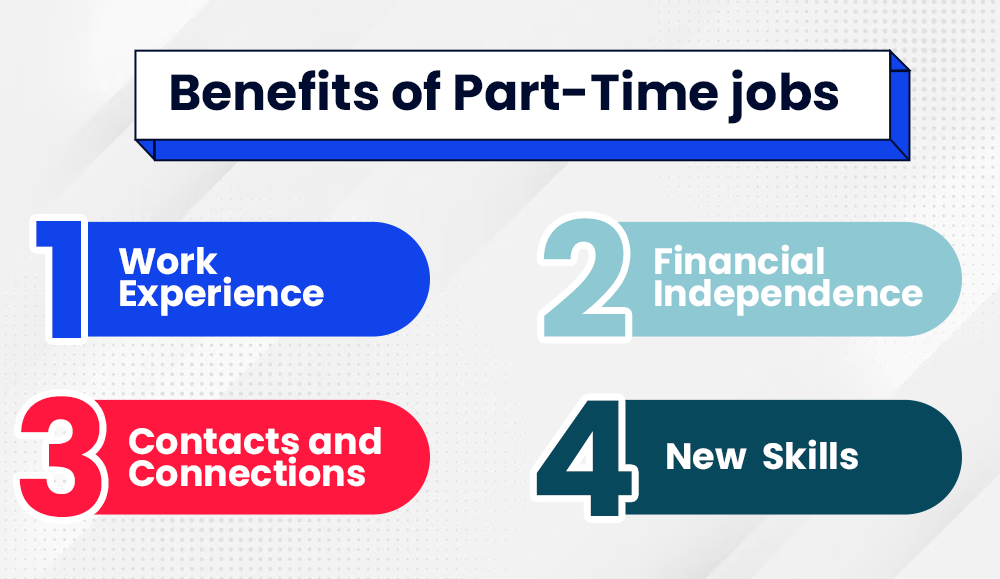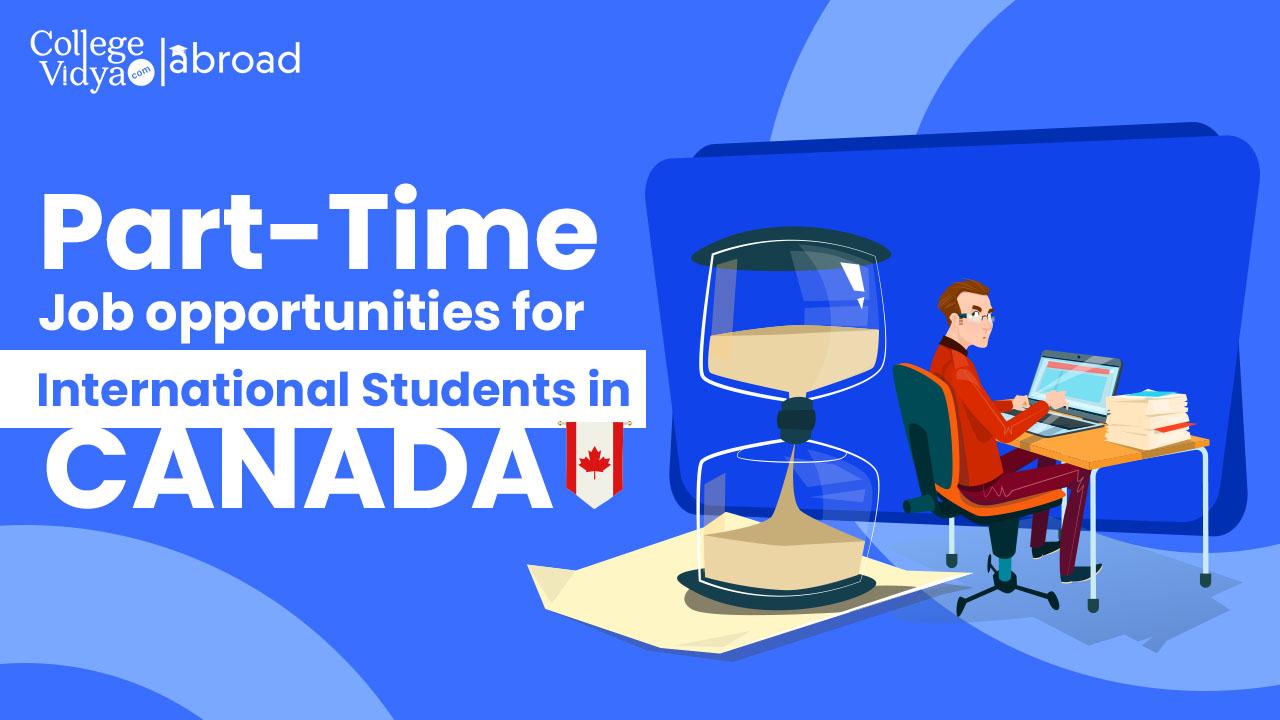Every student struggle at the initial stage of their study abroad dream. Once students reach their dream destination, they become aware of the actual battle that includes cultural differences, language barriers, academics, and most significantly, the most crucial one is “financial stress,” for which most students opt part-time jobs. After reaching the dream university and country, every student craves financial independence.
So if you are planning to study abroad in Canada or have reached there, here are some prerequisite tips and ways to earn while studying in Canada for your expenses, funds for leisure activities, and discovering/traveling the country.
Types of Part-Time jobs for international students in Canada
Once you reach Canada as a student to accomplish your study abroad dreams, you have two options for part-time jobs, that are:

- On-campus Jobs
The simplest and easiest way to find a part-time job in Canada as a student is an on-campus job, where you have to travel less and can save more time and money at the same time; all these part-time jobs work pretty for students, as they give an adequate amount of time and space to balance your academics and employment at the same time. A few departments of on-campus jobs are:
- Teaching Assistant
- College cafeteria
- Library
- Campus guide
- Bookstore
- Computer centers
All these part-time jobs are on-campus. They provide a flexible schedule to international students and allow them to get involved with the professors and learn more about the university and its rules and regulations.
2. Off-campus Jobs
These jobs are for those students who face problems in maintaining a proper schedule for their academics and students who are left with much spare time where they can work off-campus for their additional income, which also provides them direct exposure to Canadian culture and market with decent pay. A few most opted off-campus jobs are:
- Freelancer
- Dog walker
- Cab/Taxi driver
- Waiter/Server/Bartender at a restaurant or bar
- Translator
- Cashier
- Nanny/Babysitter
- Bookkeeper
- Call center/Customer service
Studying in Canada is the dream of many students. When they arrive at their dream destination, apart from academics, a student requires little funds to explore the country, its food, and culture and to support the fun and leisure activities; students go for off-campus part-time jobs, which give them better opportunities to know more about the country’s law, culture and people and vast exposure of the market. While working at different jobs, students their connections and feel more at home after interacting with the country's residents.
3. Internships or Co-op placement
Students also do various internships throughout their academic journey, which can be on or off-campus, in contrast sometimes internships offer on-the-job training as well; when a student has to work as per the requirements of their particular course or program, it is termed as a Co-op student, these jobs provide practical training and direct exposure of market to the students and help in nourishing the students for the job market. A co-op work permit is required for the work needed for the program.
Benefits of part-time jobs for international students in Canada:

- Work experience offers students a professional working atmosphere and an opportunity to experience and work in the market with experts in their respective fields.
- It provides financial independence to the students, which they can spend on their fun or leisure activities or use to pay their tuition fees or living expenses.
- Part-time jobs help build contacts and connections; when students work at different places, they get involved with the majority of residents and people, which may help or assists students in the future.
- The most important benefit that an international student can use in Canada while doing a part-time job is to adapt and learn new skills which, can also help the student to develop and understand their field of interest more deeply.
Eligibility criteria of International students for part-time jobs in Canada:
Students who own a study permit in Canada are allowed to work part-time in Canada, they are required to meet the eligibility criteria set up by the government of Canada, and the eligibility criteria for on and off-campus part-time jobs are different, as:
- Eligibility criteria for On-campus part-time jobs in Canada:
- A valid study Visa/permit is required.
- A SIN (Social Insurance Number).
- Must be enrolled in a public or private secondary college as a full-time post-secondary student.
- Eligibility criteria for Off-campus part-time jobs in Canada:
- Students must be full-time students in Designated Learning Institution (DLI).
- Must be enrolled in a public or private secondary college as a full-time post-secondary student program.
- Before the student starts working, the program must have started.
- Students must be of 18 years of age (21 in Nova Scotia, Quebec, and British Columbia).
- The duration of the enrolled program must be 6 months minimum and leads to a diploma, certificate, or degree.
- A SIN (Social Insurance Number).
- A valid study Visa/permit.
-
A few guidelines an international student must keep in mind while working part-time in Canada:

- A student can work up to 20 hours per week, and exceeding the average working hours is a direct violation of the study permit conditions, and the student must face the consequences.
- Canada's revised policies, set the minimum wage to $15 per hour.
- During vacations or summer breaks, a student can work full-time and exceed the 20-hour rule, which is meant to be followed while classes are going on, and while on vacation, a student can work overtime or two part-time jobs simultaneously.
- A student cannot start working before the break of the first semester.
- To begin working full-time, a student must be enrolled full-time, before and after the semester break.
For students who find it difficult to manage their expenses in Canada, there are plenty of part-time jobs in Canada to support their financial needs, and the government has also set some rules and regulations on account of international students to encourage them. There is no need to feel exhausted or tense. There are various of jobs and internships in every field to learn and earn simultaneously. While working a part-time job, an international student must keep in mind to not hamper their studies at any level or overrule any guideline stated by the government of Canada otherwise, and the student has to face the necessary consequences.
